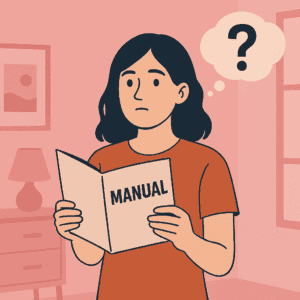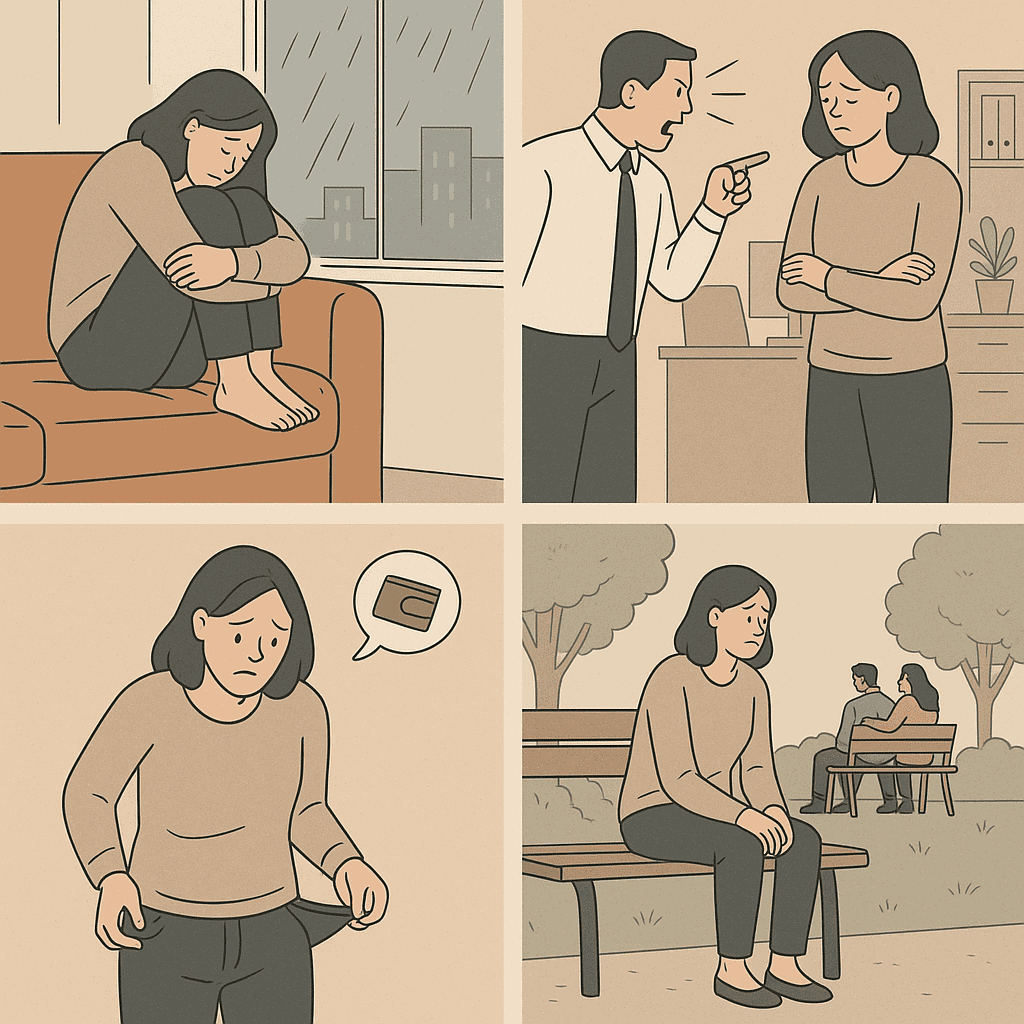11 Ways To Stay Emotionally Strong as a Woman
Emotional Strength Isn’t Built in Comfort….
Life doesn’t always warn us before it tests us. Some challenges arrive like storms—sudden, loud, and all-consuming. Others creep in quietly, lingering like fog, draining us over time. But no matter how life delivers its blows, one truth remains: we all have the capacity to rise. Even when it’s hard. Especially when it’s hard.
If you’re in a place right now where everything feels heavy, where your emotions are overwhelming and you don’t know how much longer you can hold on—you’re not alone. I’ve been there. And though our stories may be different, I know what it’s like to feel knocked down by life again and again, unsure of how to get back up.
This post isn’t filled with quick fixes or mirror affirmations that never seem to stick. This is for those who want real change. Who are tired of pretending everything’s fine. Who are ready to do the work—to feel stronger, more grounded, and more in control, even when life isn’t.
Life Doesn’t Come With Instructions—But It Does Teach You

I grew up in the wild rhythm of New York City—a place that teaches you to stay sharp, move fast, and grow a thick skin early. My childhood wasn’t simple. The school system was relentless. Home wasn’t always peaceful. My father was a contradiction—hard-working and deeply committed, but his temper often filled the room before his words did. I learned to read people early, to stay alert, to guard my inner calm long before I even knew what to call it.
Later, I entered corporate America with drive and discipline. Then I stepped away to raise my daughter, thinking I could return when the time was right. But life had changed. So had the rules. I was no longer the shiny new candidate—just older, with more questions than answers. I had to start from the bottom again, proving my worth in rooms that had already decided I didn’t belong.
Being a woman who works, nurtures, and holds it all together is not for the faint of heart. Some days it felt like I was disappearing into the roles I played. But every struggle taught me something essential: the world may not always see your value, but that doesn’t make it any less real. You just have to keep showing up—with quiet strength, with grace, and with the kind of patience that only life can teach you.
The Moment Everything Changed

I stopped hoping for life to hand me something different. I stopped waiting for external validation or the perfect timing. I started focusing on what I could control: my reactions, my patterns, and the way I treated myself when no one else was watching.
That was the turning point.
Emotional strength wasn’t about becoming hard or cold. It was about softening in the right places and firming up in others. It was about feeling pain without letting it drown me. About naming emotions—but not letting them name me. I didn’t numb out or pretend to be fine. I learned to sit with discomfort, to listen to what it was trying to teach me, and then to keep going.
That’s what real strength looks like. Not perfection. Not constant positivity. But presence.
If You’re in the Storm, Don’t Lose Hope
If life feels like too much right now, I want you to know something: your struggle is real, but so is your strength. You may not feel it today, but it’s in you. It’s in every moment you choose to keep going when everything in you wants to give up. It’s in every breath you take when the weight feels unbearable.
I’m not here to sugarcoat anything. The road to emotional strength isn’t easy. But it’s worth it. And you don’t have to walk it alone.
Start small. Choose one thing today that nurtures you. One thing that reminds you that you matter. And when life knocks again—as it will—you’ll find that you don’t fall as hard. Or if you do, you’ll rise faster.
You’ve already made it through so much. You’re still here. Still breathing. And that’s not by accident.
What Is Emotional Strength, Really?
Emotional strength isn’t about being unshakable. It’s about feeling everything and still choosing to move forward. It’s knowing when to cry and when to get your ass back up. It’s refusing to let life harden your heart while still setting boundaries like a fortress.
It’s showing up for yourself on the days you feel invisible. It’s learning to sit with pain without letting it define you. Emotional strength is quiet, steady, and often unseen. It’s in the way you choose love over bitterness, grace over anger, and hope over fear—even when no one’s watching.
1. Cry… Then Get Up and Fight Again
Suppressing emotions doesn’t make you tough — it makes you explosive.
Bottled-up feelings don’t just disappear; they find ways to leak out sideways, often when you least expect it.
If you need to cry, sob, scream into a pillow — do it. Feel it fully.
Emotions are energy, and when you move them through you instead of burying them, you create space for healing.
And after the storm?
Wash your face.
Drink some water.
Stand back up.
Resilience isn’t built in the breakdown — it’s built in the bounce-back.
Remember: letting yourself feel isn’t weakness. It’s the first step back to strength.
2. No Alcohol, No Drugs, No Numbing
I had my share of social drinking in college and the corporate parties to look cool and foot in but it stopped there. This is non-negotiable. That glass of wine or edible may help you “cope” tonight, but it’s robbing you of real healing. Substance use is a slow escape hatch that becomes a trap. I had to see people in my life unravel because of alcohol and promised myself I’d never go there. I saw the effects of alcohol, so drugs were a complete no no in my head.
3. Stop Doing Sh*t That Feels Good But Leaves You Feeling Like Crap
Let’s just call it out:
Binge eating.
Doom scrolling.
Sugar highs.
Toxic relationships.
Over-shopping.
Over-drinking.
Whatever your thing is — it numbs the pain in the moment, but it usually amplifies the shame later.
Temporary comfort, long-term regret.
But here’s the real shift:
The next time you reach for a coping mechanism, just pause and ask yourself:
Will I feel better tomorrow — or worse?
It doesn’t mean you have to be perfect. It means you stay conscious.
You interrupt the autopilot.
Hard truth: not everything that feels good is good for you.
And real self-care sometimes means choosing what feels uncomfortable now to protect your peace later.
4. Lean on a higher power
There were times when I couldn’t lean on anyone—not even myself. I didn’t have the answers. I didn’t have the strength. But I could still whisper a quiet prayer.
That simple moment of reaching out—even if I didn’t know what to say—helped me feel less alone. That connection to something bigger than me, whatever name you call it, became my steady ground. I’m not talking about being overly spiritual or perfect in faith. Just having something to hold onto when everything else felt shaky.
That’s how I find peace when life feels out of control. It reminds me I’m not carrying everything by myself. And honestly, knowing that makes it a little easier to keep going.
5. Control What You Can: You
People will hurt you.
Life won’t always go the way you hoped.
That’s just the truth.
But in the middle of all that chaos, there’s one thing you always, always have power over — you.
Your thoughts.
Your reactions.
Your choices.
You get to decide:
Will you carry the weight or set it down?
Will you let it make you bitter or better?
True strength isn’t about fixing everything around you. It’s about showing up with intention — even when everything feels like it’s falling apart.
Ancient Stoics like Epictetus and Marcus Aurelius taught that while we can’t control external events, we can control how we respond to them.
Your real power lives in that tiny, sacred space between what happens to you — and how you choose to meet it.
Choosing who you’ll be, again and again, no matter what life throws at you.
That’s the work.
That’s the freedom.
6. Force Yourself to Move
Working out saved my mind before it ever sculpted my body. Movement is medicine. Shadow box, walk your dog, dance like a lunatic in your room—just move. Movement clears mental fog and reminds you that you’re still here. Still capable. Still fighting.
And it doesn’t always have to be loud. Sometimes, healing comes in silence. A slow yoga flow that helps you breathe through the pain. A five-minute meditation that pulls you out of your spiraling thoughts and back into your body. Even stillness is a form of movement when it shifts your state. So when your mind starts to drown in the heaviness—move. Any way you can. Just don’t stay stuck.
7. Find Positive Distractions
Distractions don’t have to be a bad thing — not if they’re building you.
Instead of mindlessly scrolling or getting caught up in the noise, why not pick up something that sparks your creativity?
Paint. Write. Learn how to build a bookshelf. There’s power in putting your hands to work, creating something, and breaking away from the mental clutter.
Idle minds tend to spiral, but productive hands tend to heal. When you’re engaged in something that requires your attention and focus, it’s like giving your mind a much-needed break from the chaos.
Sites like Domestika, Craftsy, Skillshare, and Udemy offer courses on everything — from art and photography to cooking and design. And you don’t have to commit to something huge. Even picking up a simple craft kit, knitting, or trying a new recipe can shift your energy.
It’s not about becoming perfect at anything. It’s about creating space in your day that’s yours.
A moment of peace.
A spark of joy.
A reason to keep going when life feels heavy.
When you find that thing that makes you feel alive — whether it’s a craft, a hobby, or a project — you create something more valuable than just the end result. You create a sense of flow and accomplishment, no matter how small.
8. Stop Feeling Sorry for Yourself
It sounds harsh. But no one’s coming to rescue you. Some people have it better, some worse — but comparison is a dead-end street.
Start where you are with what you’ve got.
Book recommendation: “Can’t Hurt Me” by David Goggins — a brutal, brilliant story about grit and accountability.
9. Stop Wishing Life Was Different
Stop waiting for a different life to begin. This is the one you’ve been given. Not by mistake, but on purpose. Every hard moment, every detour, every heartache—it’s shaping you. Don’t waste time wishing things were easier. Wish instead for the strength to carry what’s yours. When we stop resisting our story, we start learning from it.
There’s a story from ancient wisdom—sometimes told by the Sufis—about a man who cursed the weight of his cross, saying it was too much to bear. One night, he dreamt he entered a room full of crosses of every shape and size. He was told to choose a different one. He looked around and finally picked a small, manageable one. “That one,” he said. And the voice replied, “That’s the one you came in with.”
We don’t always get to choose our challenges, but we can choose to believe they’re part of a deeper design. Accepting that is where real peace begins.
10. Stop going to the same toxic people and expect different results.
What’s that saying? “The definition of insanity is doing the same thing over and over and expecting different results.” That’s not just about routines—it’s about people too. Emotional grit isn’t just about surviving pain; it’s about breaking patterns that keep causing it.
That boyfriend who’s always emotionally unavailable? He’s not going to wake up one day and suddenly love you right ? That friend who ghosts you until life falls apart again? That’s not loyalty—that’s convenience. And every time you go back, hoping for something different, you’re handing your peace to people who never earned it.
Emotional strength is also boundaries. It’s loving people from a distance when closeness keeps costing you. It’s keeping the hell away from the people who make healing harder. That’s not cold—that’s clarity.
Emotional strength isn’t about pretending everything’s okay or never feeling pain. It’s about choosing to rise again — even if you do it slowly, quietly, or with trembling hands. Life will knock you down. That’s inevitable. But staying down? That’s a choice — and one you don’t have to make.
Every time you set a boundary, take a deep breath instead of snapping, or keep going when it would be easier to give up — you’re building strength. Not the kind people applaud, but the kind that carries you through the storm.
11. Get Help When You Need It
Strong women ask for help. Let’s stop acting like we have to figure it all out alone. There are things outside of your control, and that’s okay.
Therapy isn’t weakness—it’s wisdom. Medication isn’t giving up—it’s a tool.
Sometimes, getting professional help is the smartest move you can make. You don’t have to carry everything by yourself. And just because you need help now doesn’t mean you’ll need it forever.
It just means you’re human.
You don’t need to be unshakable. You just need to be unwilling to quit.
So take your time. Heal. Reflect. And when you’re ready, stand back up — because your story isn’t over yet.


